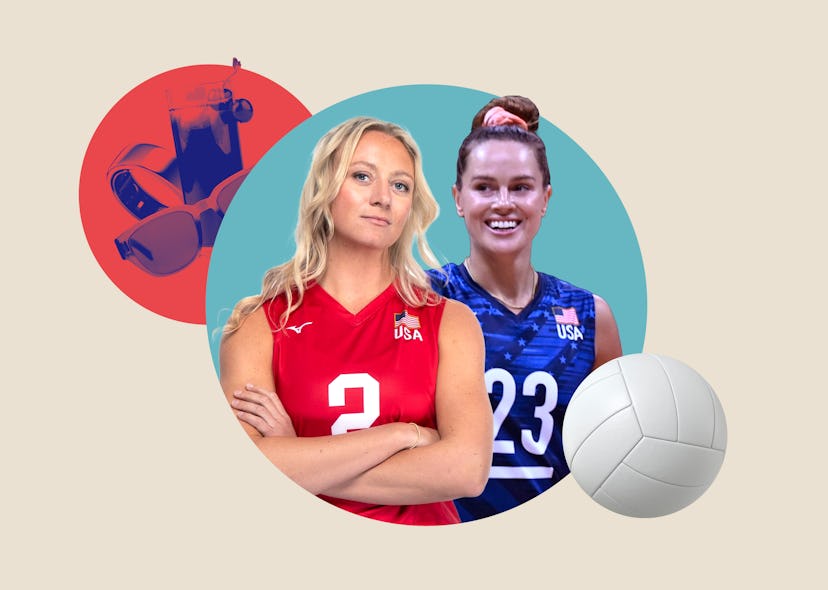Wellness
8 Life Hacks For Feeling Like An Olympian
Tart cherry juice, blue light glasses, and other self-care tips from Team USA Volleyball.

Dealing with stress under normal human circumstances — say, juggling an overwhelming project at work while navigating the social intricacies of a bridesmaids group chat — is hard. And that’s without the pressure of Olympic glory hanging in the balance.
I caught up with Team USA Volleyball after they beat France 3-0 in the preliminary round on Aug. 4. They’ve since beaten Poland (again, 3-0) and Brazil (3-2), and they have a shot at earning a gold medal on Aug. 11. How, I wanted to know, do they keep themselves feeling their best, both physically and mentally?
Both setter Jordyn Poulter and outside hitter Kelsey Robinson Cook cited a slew of self-care practices that keep them in top form.
“That’s been a big key for me, focusing on my mental health and meeting with sports psychologists,” Robinson Cook says. “Being able to calm down from big moments, that translates both on and off the court.”
Poulter agrees. “There’s a key theme for me,” she says. “It’s balance.”
Easy to say, harder to actually achieve. I’m not going to gatekeep — here are their best tips.
Practice Breathwork & Visualization
Robinson Cook is a fan of a method that people on your FYP call a double inhale and experts refer to as a physiological sigh. To reduce stress on the spot, take a full breath in through your nose, pause, take a quick sniff, and then exhale through your mouth.
“It [works by popping] open the air sacs in your lungs that might have collapsed due to the shallow, rapid breathing associated with being stressed out,” psychologist Roberta T. Ballard, Ph.D, previously told Bustle.
The athlete also practices deep breathing. “As much air as you can get in, then as much air as you can get out,” she says.
She pairs her breathwork with visualization: “What do I look like on the court? What do I feel like? Where are my eyes?”
These techniques can have a major impact. “Having these together allows me to go out on the court and be free,” she says.
Drink Tart Cherry Juice Before Bed
Poulter follows the standard advice for getting good sleep: no late dinners or caffeine. But she also incorporates a more unusual practice.
“Tart cherry juice before bed keeps my sleep quality high,” she says.
The drink helps your body release melatonin, a product of tryptophan (the same amino acid that makes turkey trigger a post-Thanksgiving nap).
There isn’t much research to back this up, but one small study from 2018 found that tart cherry juice can help elderly people with insomnia.
Take An Ice Bath
“Ice baths really help with sleep,” Poulter says.
The actual research, however, is mixed. A 2021 study of male athletes found that frigid dunks promote sleep, contradicting a 2013 study of cyclists. But hey, if it works, it works.
Track Your Sleep
A less chilly hack for better slumber? Robinson Cook calls her Oura ring a “game-changer.” The smart ring tracks sleep (as well as stress and fitness) and offers personalized recommendations for improvements.
“I’m really seeing what I’m actually sleeping within a night,” Robinson Cook says. “I could [feel] asleep for 10 hours, but am I actually asleep for eight?”
Get Out Of Bed ASAP
Night owls, I’m sorry to report that early birds really do catch the worm — or set a volleyball. “As soon as [I’m awake], I don’t like to linger in bed,” Robinson Cook says.
Take A Distraction-Free Walk
Once she’s up, she leaves her phone at home and takes a walk. “No distractions, just kind of being present with myself before the day gets going,” Robinson Cook says. She likes to repeat the routine at night “to let go of the day, good or bad, and recenter.”
Poulter also says that being “really intentional” with her phone use keeps her sharp. (As most people probably know firsthand, heavy phone use can lead to trouble with concentration and sleep, among other issues.)
Try Blue Light Glasses
“A lot of us [on the team] wear blue light glasses,” Poulter says. These accessories are thought to prevent eye strain and improve sleep.
Again, although a lack of scientific evidence supports those theories, many people report that the glasses really do work.
Don’t Skip R&R
Both players say downtime is crucial for their well-being, and you don’t need to be an athlete in order to reap the same benefits.
“We really do need to unwind and rest,” says Robinson Cook.
And as for Poulter? “Refilling my cup with loved ones outside of the gym allows me to show up 100%.”